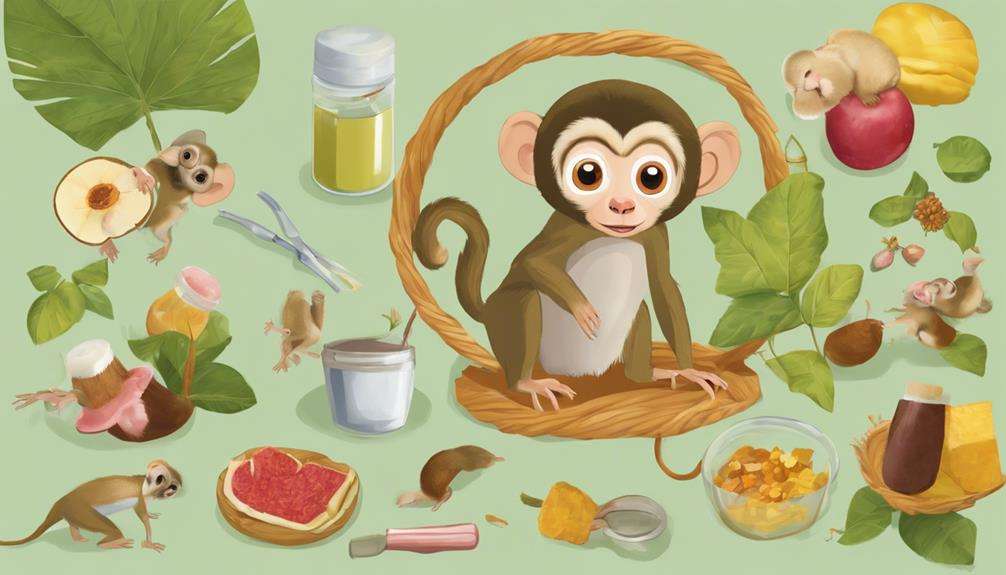If you've ever wondered about the potential health risks of owning pet tamarins, consider this – the case of a tamarin owner who developed a severe infection after being bitten. This incident sheds light on the importance of understanding not only the physical risks associated with these primates but also the behavioral challenges they may present.
Before bringing a pet tamarin into your home, it's vital to be well-informed about the various health risks involved and how to address them effectively to guarantee a safe and harmonious environment for both you and your exotic companion.
Key Takeaways
- Tamarins can transmit zoonotic diseases like herpes B and measles to humans.
- Aggression in Tamarins may stem from stress or fear, requiring proper care.
- A balanced diet with canned marmoset food, fruits, and supplements is essential.
- Ensuring a safe environment by removing hazards is crucial for pet Tamarins' well-being.
Zoonotic Diseases to Watch Out For
When considering the health risks associated with owning pet Tamarins, it's imperative to be vigilant about zoonotic diseases that can be transmitted from these monkeys to humans. Zoonotic diseases are illnesses caused by harmful germs like bacteria, viruses, parasites, and fungi that can spread between animals and people.
One notable zoonotic disease of concern with pet Tamarins is herpes B, which can be transmitted through bites or scratches and poses a serious health risk to humans. Additionally, Tamarins can potentially carry and spread viral infections such as measles, chickenpox, and mumps, further highlighting the importance of understanding the potential health risks involved in owning these primates.
Cold sores, caused by the herpes virus, aren't only dangerous to Tamarins but can also be transmitted between humans and these monkeys. To mitigate these risks, TB testing using the intradermal skin test can help assess the health status of pet Tamarins. Owners must adhere to strict hygiene practices to prevent infections and assure the well-being of both themselves and their pet Tamarins.
Behavioral Issues and Aggression
Considering the health risks associated with owning pet Tamarins, understanding their behavioral tendencies and potential for aggression is essential for ensuring a safe and harmonious environment for both you and your primate companion.
Tamarins, when feeling threatened or stressed, may exhibit aggression through behaviors such as hitting, biting, or even throwing objects. Proper care and attention are critical in managing and minimizing these aggressive tendencies in pet tamarins.
It's noteworthy that tamarins may require time to adapt to new situations or environments, which if not handled appropriately, could lead to aggressive responses. Aggressive behavior in tamarins is often a result of stress, fear, or insufficient socialization.
Dietary Concerns and Nutritional Needs

To guarantee the best health and well-being of your pet Tamarins, it's essential to provide a varied diet that includes canned marmoset diet, fruits, vegetables, meats, and supplements.
Tamarins have complex dietary needs that must be met through a combination of these food sources. The canned marmoset diet serves as a base, providing essential nutrients tailored to their requirements.
Fruits and vegetables offer important vitamins and minerals, while meats contribute to their protein intake necessary for muscle development and overall health. Additionally, supplements play an important role in filling any nutritional gaps that may exist in their diet.
Environmental Hazards in Home Settings
While ensuring proper nutrition is essential for your pet Tamarins, it's equally important to be aware of potential environmental hazards present in your home setting. Tamarins can be exposed to toxic substances such as cleaning chemicals commonly found in households. Additionally, certain household plants and foods can pose a risk to tamarins if ingested, leading to health complications. Improper storage of medications is another concern as it can result in accidental poisoning in pet tamarins. Moreover, electrical cords and small objects within reach can be hazardous if tamarins chew on them, potentially causing injuries or electric shocks.
When considering outdoor hazards, tamarins may encounter dangers like pesticides or fertilizers, which can be harmful if accessed. Being mindful of these environmental hazards and taking preventive measures, such as securing toxic substances and keeping dangerous items out of reach, is essential to ensure the safety and well-being of your pet tamarins in your home environment.
Common Health Conditions in Pet Tamarins

Pet tamarins are prone to various health conditions, including susceptibility to diseases such as measles, chickenpox, and mumps, all of which can have fatal consequences for these animals. Cold sores and the herpes virus also pose significant health risks to marmosets and tamarins.
Regular TB testing using the intradermal skin test is essential to monitor the health of pet tamarins and detect any potential infections promptly.
Diarrhea is a common health issue in pet tamarins, often associated with dietary changes and stress. Maintaining proper hygiene and cleanliness in their living environment is critical to prevent infections and assure the overall well-being of your pet tamarins.
Frequently Asked Questions
Can You Keep a Tamarin as a Pet?
You can keep a tamarin as a pet, but it requires careful consideration of tamarin behavior, diet, enclosure, enrichment, socialization, and legalities. Understanding these aspects guarantees the well-being of both the tamarin and yourself.
What Are the Disadvantages of Having a Pet Monkey?
When keeping a pet monkey, understand the behavioral challenges, socialization needs, legal restrictions, zoonotic risks, environmental enrichment, and time commitment involved. Prioritize the well-being of both the monkey and yourself to guarantee a harmonious relationship.
Do Pet Monkeys Carry Diseases?
To keep your furry friends safe, remember that pet monkeys can carry diseases. Take health precautions seriously, as zoonotic infections can spread through bites and scratches. Regular veterinary care and hygiene practices are essential.
What Is the Safest Monkey to Have as a Pet?
When considering an exotic pet, primate behavior is essential. Legal restrictions, animal welfare, and training methods are important. Habitat requirements vary among species. Tamarins are generally safer due to their non-aggressive nature and social bonds.
Conclusion
As you navigate the world of owning pet tamarins, remember that they're more than just cute companions – they're complex beings with unique needs and potential health risks.
By understanding and addressing these risks with care and dedication, you can create a safe and harmonious environment for both yourself and your tamarin friend.
Just like a delicate tapestry, each thread of precaution and awareness weaves a stronger bond between you and your furry companion.






